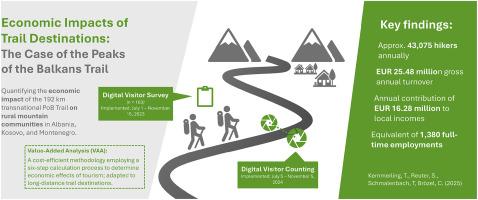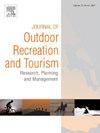Economic impacts of trail destinations: The case of the Peaks of the Balkans trail
IF 4.4
3区 管理学
Q1 HOSPITALITY, LEISURE, SPORT & TOURISM
Journal of Outdoor Recreation and Tourism-Research Planning and Management
Pub Date : 2025-09-04
DOI:10.1016/j.jort.2025.100928
引用次数: 0
Abstract
This study quantifies the economic impact of the Peaks of the Balkans (PoB) Trail, a 192 km transnational hiking trail in Albania, Kosovo, and Montenegro, on rural mountain regions in the post-pandemic Anthropocene. Using Hubert Job's Value-Added Analysis (VAA), the research integrates electronic visitor counting (2024) and expenditure surveys (2023) to estimate visitor numbers, spending patterns, and primary and secondary local income effects. Results show approximately 43,075 hikers annually, with an average daily expenditure of EUR 73.93 per person. The trail generates an estimated EUR 25.48 million in gross annual turnover, contributing EUR 16.28 million in local income effects and supporting the equivalent of 1380 full-time jobs. The findings highlight the PoB Trail's role in driving rural economic development through tourism revenue, job creation, and infrastructure improvements. Building on the adapted methodology, a transferable and cost-efficient model is presented for evaluating the economic effects of long-distance trails on rural communities in emerging economies.The case of the PoB trail exemplifies how long-distance trail destinations can transform local economies while promoting regional cooperation and resilience in the post-pandemic Anthropocene, offering insights into evolving hiker mobilities driven by an intensified desire for nature-based experiences during that period and reinforcing the significance of long-distance trails as both economic assets and a form of movement heritage.

旅游目的地的经济影响:以巴尔干半岛之峰为例
本研究量化了巴尔干之峰(PoB)步道的经济影响,这是一条位于阿尔巴尼亚、科索沃和黑山的全长192公里的跨国徒步旅行步道,在大流行后的人类世对农村山区的影响。利用Hubert Job的增值分析(VAA),该研究整合了电子游客计数(2024年)和支出调查(2023年),以估计游客数量、消费模式以及主要和次要的当地收入影响。结果显示,每年约有43,075名徒步旅行者,每人平均每日支出73.93欧元。据估计,这条铁路的年营业额为2548万欧元,为当地贡献了1628万欧元的收入,并提供了相当于1380个全职工作岗位。研究结果强调了PoB小道通过旅游收入、创造就业机会和改善基础设施在推动农村经济发展方面的作用。在此方法的基础上,提出了一个可转移且具有成本效益的模型,用于评估长途步道对新兴经济体农村社区的经济影响。PoB步道的案例说明了长途步道目的地如何改变当地经济,同时在大流行后的人类世促进区域合作和复原力,为那段时期对基于自然的体验的强烈渴望所驱动的徒步旅行者流动性的演变提供了见解,并加强了长途步道作为经济资产和运动遗产形式的重要性。
本文章由计算机程序翻译,如有差异,请以英文原文为准。
求助全文
约1分钟内获得全文
求助全文
来源期刊

Journal of Outdoor Recreation and Tourism-Research Planning and Management
HOSPITALITY, LEISURE, SPORT & TOURISM-
CiteScore
6.70
自引率
5.30%
发文量
84
期刊介绍:
Journal of Outdoor Recreation and Tourism offers a dedicated outlet for research relevant to social sciences and natural resources. The journal publishes peer reviewed original research on all aspects of outdoor recreation planning and management, covering the entire spectrum of settings from wilderness to urban outdoor recreation opportunities. It also focuses on new products and findings in nature based tourism and park management. JORT is an interdisciplinary and transdisciplinary journal, articles may focus on any aspect of theory, method, or concept of outdoor recreation research, planning or management, and interdisciplinary work is especially welcome, and may be of a theoretical and/or a case study nature. Depending on the topic of investigation, articles may be positioned within one academic discipline, or draw from several disciplines in an integrative manner, with overarching relevance to social sciences and natural resources. JORT is international in scope and attracts scholars from all reaches of the world to facilitate the exchange of ideas. As such, the journal enhances understanding of scientific knowledge, empirical results, and practitioners'' needs. Therefore in JORT each article is accompanied by an executive summary, written by the editors or authors, highlighting the planning and management relevant aspects of the article.
 求助内容:
求助内容: 应助结果提醒方式:
应助结果提醒方式:


